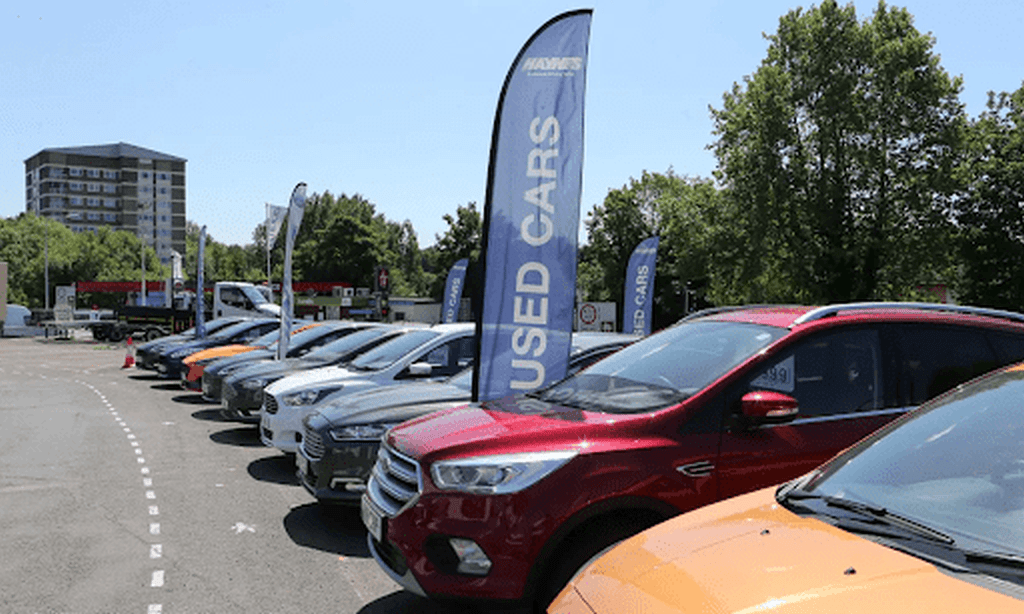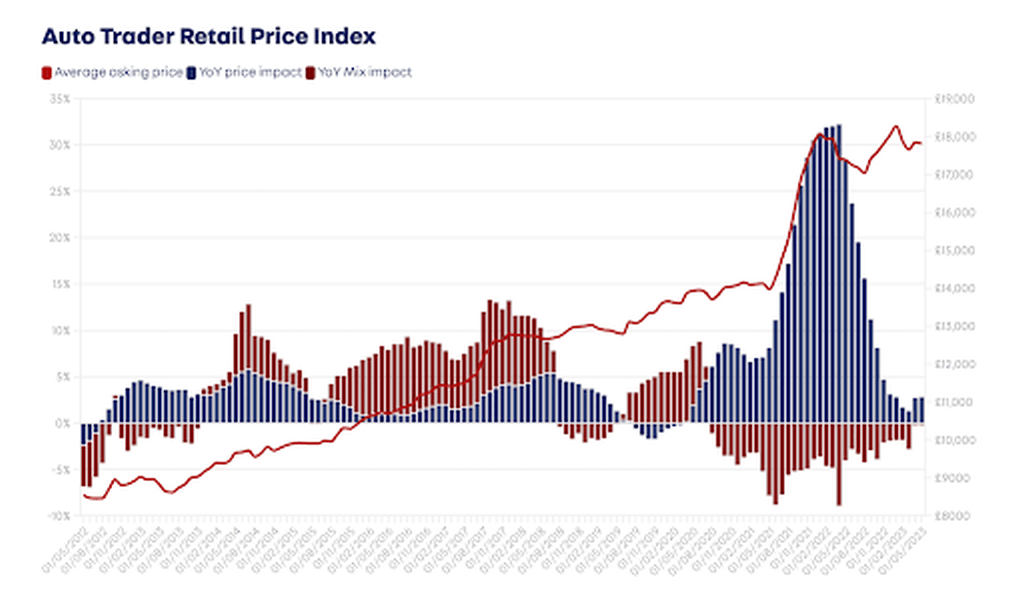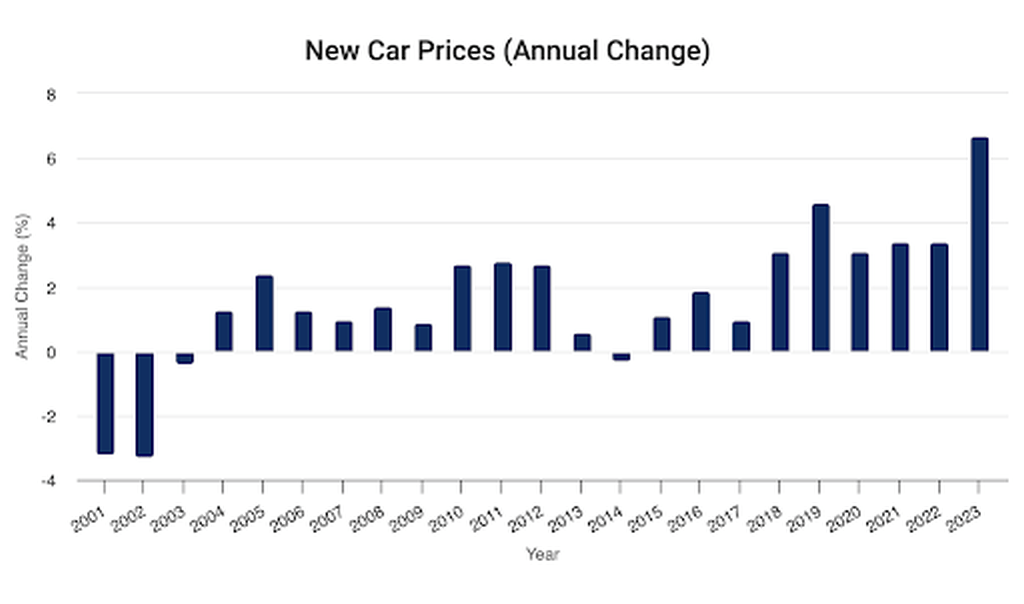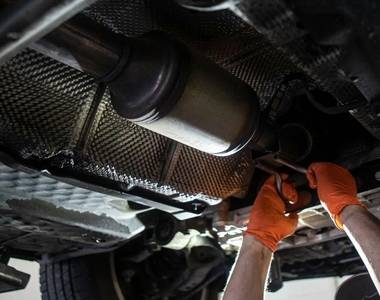If you've shopped for a used car in the last few years, you know just how real ‘sticker shock’ can be. Some of it we can explain with a simple supply-and-demand curve. Other elements are based on changing economic factors and age-old trends.

In the UK, used cars have become far more expensive in the last three years. In this article, we break down the reasons why, and how you can navigate this.
The Rising Costs of Second-Hand Cars: Understanding the Price Surge

The used car market has continuously defied the one Golden Rule of auto market dynamics: the moment you drive it off the forecourt, it's worth less than what you paid for it. And it's only down from there.
If you had plans to sell your car online or take it to a dealership, a year ago would have been the best time. The second best time, apparently, is now.
When everyone got back on the road as pandemic restrictions edged their way out, the rocketing market price of used cars made staying mobile an increasingly costly endeavour. Second-hand cars soared nearly £4,000 in just a year and are slowly growing again.
How much have used car prices gone up by?

According to the AutoTrader Retail Price Index, the average used car sold for £14,155 back in January 2021. That same time just a year later, that figure soared to over £18,000.
By April 2022, the year-over-year price increase was 32% — some UK residents who bought used cars in 2020 or early 2021 could have literally sold them for a profit.
Since then, pricing surges have cooled off. AutoTrader reported a dip in prices in the last quarter of 2022. And AA Cars reported the prices of used cars grinding to a halt within that same time frame.
More recently, AutoTrader data underscores new price growth once again, but at a much slower pace. In May 2023, the average retail price of a used car increased 2.8% (which still notably marks the 38th consecutive month in YoY growth).
According to the abovementioned data from AutoTrader, one in five 'nearly new' used cars is worth more than its brand-new counterpart.
In simple terms: Prices surged a lot in 2021. They eventually stopped increasing at such alarming rates, but they never came back down. Now, they're gradually on the rise again.
So, why are second-hand cars so expensive in the first place?
We can answer this question the short way and the long way.
The short answer: Supply and demand.
The long answer: Let's start by looking at the economic context of 2021.
In early 2021, the UK economy was on an incline from its slump in 2020 due to the pandemic. People had money to spend — both individuals with disposable income and businesses that could afford larger investments — and there wasn't enough supply in second-hand car market to meet the new demand.
Macro trends like the global semiconductor shortage and Brexit-related tariffs only made it harder to produce and import new cars.
As a result, used cars became scarce and expensive.
Furthering this trend was the fact that more people were on the hunt for second-hand cars — and not just in one segment of the population. For instance, with remote work becoming increasingly popular (and here to stay), business owners started shopping for more affordable second-hand vehicles to replace their conventional cars. Some — who couldn't have predicted their future lack of need — were even selling their cars on finance.
10 Reasons Used Car Prices Have Exploded
Simple economics tells us the more cars we produce, the lower their value should become. But second-hand cars have been bucking the trend in recent years and are becoming increasingly expensive to buy.
To further elaborate on the issue (or web of issues as we prefer to call it), here are ten reasons used cars have become so expensive in the last two years:
High demand
Of course, the main driver of used car prices is their demand. If there weren't any, prices wouldn't be so high in the first place.
Initially, 'pent-up demand' was the main driver — lifted pandemic restrictions made it possible for everyone whose interest in a second-hand car compounded over the course of 2020/early 2021 to actually go out and buy one. Fresh out of the lockdown, fewer people wanted to take public transport for fear of transmission as well.
After two more lockdowns, everyone became used to selling vans, cars and motorbikes online. The rising demand and ease of completing the transaction made for an attractive combination.
Shortage of semiconductors for new cars
Around that same time, the semiconductor shortage hit the global auto industry like a ton of bricks. Most automakers had a hard time ordering enough chips (and other components) for their new models, so they couldn't meet the increased demand for brand-new cars.
This, combined with ongoing COVID restrictions in some territories across the UK, caused car production to sink to its lowest point in 65 years. Fewer than 55,000 cars were built in July 2021, representing a nearly 38% drop from July 2020.
In some instances, auto manufacturers found themselves altering vehicle specs on short notice. Some ceased taking orders for several models.
The resulting short supply of shiny new cars made second-hand ones a much more attractive (and affordable, for a short time) option to buyers.
Dependence on Ukraine for wire harnesses
Ukraine is a key producer of wiring harnesses — the bundles of electric wires used to link the various components and systems of a car. Inside each car sits around three miles of wiring, and European and UK manufacturers have relied on Ukraine for low-cost production.
With 17 manufacturing facilities across the country, the war in Ukraine has put tremendous strain on BMW, Porsche, Volkswagen, Audi, Mercedez-Benz, and numerous other automakers.
Higher energy and production costs for new cars

With scarcity in the new car market and increased production costs, those prices also went up. From 2021-2022, new car prices rose an additional 3.3%.
In mid-2022, auto manufacturers in the UK faced a £90 million cost hike. According to an analysis from the Society of Motor Manufacturers and Traders (SMMT), this surged domestic vehicle production costs by as much as 50%.
As of now, electricity in the UK is more expensive than any of its European car-producing counterparts (and 59% higher than the EU average). The year prior, the UK could have saved more than £50 million had they outsourced their energy production to the EU.
In 2023, production costs are still following this trend. And since demand is relatively high, dealers can maintain their margins and let the consumer bear more of the extra burden.
Inflation and economic factors
In June 2023, inflation slowed to 7.9% — a nice turnaround from the previous month (8.7%). Since March 2022, that's the lowest it's been.

But when in doubt, zoom out. This inflation rate pales in comparison to the meteoric rise in the Consumer Price Index (CPI) back in January 2021.
As long as inflation remains at such a high percentage, prices of everything from products to services will continue to go up. Cars, too.
Brexit-related tariffs
When the UK left the European Union in late 2020, it opened up a Pandora's box of associated costs and hurdles — one of them being Brexit-related tariffs.
Under the new EU-UK post-Brexit trade deal, EVs will have to have 45% of the components sourced from either side of the channel starting in 2024. For battery cells and packs, this requirement is 50% to 60%.
That's a tall order if you consider that auto manufacturers in the UK are already having a hard time sourcing enough (and affordable) components to keep up with demand. And if automakers can't meet these requirements, they face British/EU import tariffs of 10%.
Changes in technology and features
Although used car prices are up industry wide YoY, something interesting is happening with the EV market.
Technology has seemingly made EVs more accessible to the public. So EV prices have continuously declined, according to insights from AutoTrader. In May 2023, prices fell 18.6%.
On one hand, used Teslas fly off the forecourt in an average of 22 days. On the other, this still makes up only 13% of total revenue for the auto industry.
As part of the UK embraces EVs, a majority still finds them too expensive to compete with a traditional gas model.
Seasonal fluctuations
Seasonality affects vehicle prices regardless of whether you're selling a damaged car, a new car, or a lightly used one.
Summertime (the time of this writing) is the busiest season for used car sales, so buyers can expect to be presented with a large selection of vehicles and higher prices — especially during June-August when everyone's trying to get away on holiday.
Lack of new competition
Aside from a few innovative EV players (which could still be absorbed by larger companies), there's really no new competition in the used car market.
Most of these second-hand cars are coming from the same manufacturers, or their subsidiaries, which means they have no incentive to reduce prices either.
With such a saturated market and lack of fresh blood, the status quo isn't going anywhere anytime soon.
Financing and interest rates
Interest rates for financed cars, as of June 2023, now sit at 5% — the thirteenth hike since the beginning of 2021. Such a jump in financing fees can put an unaffordable strain on buyers who are already cash-strapped.
It's much more common to finance a used car than to buy a car for cash, and the current interest rate environment is making it hard for buyers to get a good deal.
Will used car prices go back down?
The price surge of used cars would have been much more noticeable had it not been for scrappage schemes — government-funded initiatives allowing people to trade their old car for a new one with a bonus incentive.
This also partially explains why prices are suddenly level again: With these bonuses running out, people are now opting for second-hand cars instead of new ones.
But, even with the introduction of these schemes, it's unlikely that used car prices will go back down to pre-pandemic rates anytime soon.
The only possibility for a reversal lies in the commercial fleet market, which saw sales rise 37% in May 2023. If market prices continue to change relatively slowly amid interest rate hikes and inflation, constant fleet replacement and discounting wil feed the second-hand market.
Since most old fleets are auctioned off at lower rates, retail prices will eventually follow.
That said, Chinese companies are the only ones able to produce high output at low margins. Unless we exclusively drive MGs and one-off models made in China, other companies will face no pressure to come down on pricing.
The actual price of a vehicle varies depending on its condition and age, but one thing is certain: used cars are expensive. And they will probably continue to be for the foreseeable future.
Interested in learning more? These are the questions our readers ask us the most.
Why are dealers charging so much for used cars?
Although the true answer as to why used cars sell for so much is complicated, it boils down to three things: supply shortage, higher production costs, and inflation. Aside from that, they're also charging so much 'because they can'. With continuous demand and no lower-cost market entrants, there is no economic benefit to reducing prices at the moment.
Are UK second-hand car prices still high?
Cars are expensive in the UK due to a combination of factors such as higher production costs, Brexit-related tariffs and currency fluctuation. Without an economic reason for dealers to bring down costs, this trend will likely continue.
Is now a good time to buy a used car in the UK?
In the latter half of 2023, UK used car prices are projected to drop slightly. Whether they will continue to fall or rise again requires analysis even experts aren't capable of. Considering the multifaceted situation, it's really up to you as a buyer to evaluate how time-sensitive your situation is and whether or not you're strapped for cash.
How much mileage is good for a used car in the UK?
Most people drive their cars about 7,500 miles per year. You can figure out how many miles the used vehicle in question should reasonably have by multiplying the number of years it's been on the road by 7,500. If your car has fewer than 7,500 x (vehicle age in years), it's probably in fair shape. If its mileage is considerably higher, you might want to look elsewhere.
How much does the average second hand car cost in the UK?
How much you can sell your used car for depends on how you sell it and what condition it's in. If you're selling a non-running car (or selling a salvage car), you still won't get much for it. But newer models that match their in-demand 2023-2024 counterparts will fetch you a higher price. On average, a used car in the UK costs roughly £18,000.
Are second-hand cars more expensive than new in the UK?
Currently, some second-hand cars are now more expensive than their new counterparts. This interesting phenomenon is due to the supply and demand of used cars in the UK. Many people are now turning to second-hand cars since they tend to be more affordable than buying a new car from a dealership. This increase in demand has caused prices to rise, making them sometimes more expensive than their newer counterparts.
How does the pricing of second-hand cars compare to new cars?
Of course, most new cars are still more expensive than used ones on a macro level. New cars are still in high demand, so the price is still trending upward. But the secondary market has exploded due to recent supply chain shortages and higher production costs.
Are there specific car models or brands that tend to be more expensive when bought second-hand?
Newer models will almost always be more valuable than older used cars (with the exceptions of classics and rare vintages) due to current technology, safety features and performance. Luxury brands like BMW, Mercedes-Benz and Porsche will always be more expensive than mass-market cars due to their prestige. The same goes for certain sports utility vehicles which are now in high demand.
Are there any legal or regulatory factors that impact the pricing of used vehicles?
There is nothing holding a dealer back from charging a customer as much (or as little) as they want for a new car. It is up to the buyer to decide whether the offered price is a good deal for them. There are legal implications for deceit and misbranding, but these have nothing to do with the actual price of the vehicle.
What are some common misconceptions about the high prices of second-hand cars?
The most common misconception about the used car market is that all used cars are higher in price. In actuality, EVs have come down in price significantly — a huge contributing factor to the relative speed with which used Teslas drive off the forecourt.
Are there any hidden costs associated with purchasing a used car?
If you decide to buy a used car, you might have to service it more often. Depending on how old it is, it's probably more likely to break down or need repairs than a new car. There are also costs for failing an MOT test and the subsequent repairs, which is much less likely with newer models.
How do supply and demand dynamics affect the pricing of second-hand vehicles?
In the UK, demand for second-hand cars is high due to economic pressures and supply chain disruptions. With few new cars available, used car prices have increased as buyers rush to meet their needs. On the other hand, if there is an oversupply of vehicles, prices will go down as dealers try to offload them in order to make room (and money) for more.










